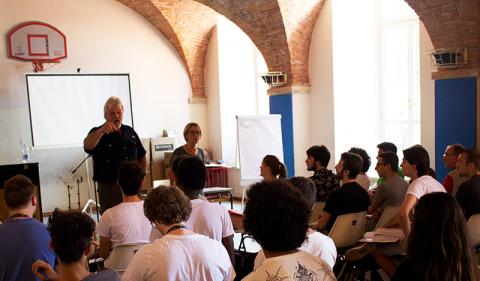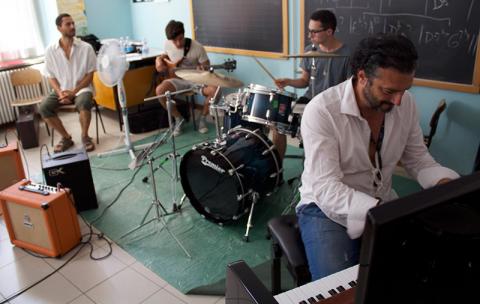Inside the Classrooms at the 30th Annual Berklee at Umbria Jazz Clinics

Mikolaj Poncyliusz, a student at the Berklee at Umbria Jazz Clinics in Perugia, Italy, practices with his guitar charts in between classes on July 13, 2015.
Photo by Mike Keefe-Feldman

An ear training class at the Berklee at Umbria Clinics practices solfege with Scott deOgburn, director of special lectures at the clinics.
Photo by Mike Keefe-Feldman

Nedelka Prescod, assistant professor in Berklee’s Ensemble Department, works through harmonies with vocalists at the Berklee at Umbria clinics; several of the students are Italian opera singers eager to explore gospel and other genres.
Photo by Mike Keefe-Feldman

Ron Savage, chair of Berklee’s Ensemble Department, demonstrates the important nuances his percussion students must listen for, such as off-beat 16th notes common to many funk arrangements.
Photo by Mike Keefe-Feldman

Donna McElroy (lower right), voice professor, explains the concept of vocalese to students as Anne Peckham (third from right), Voice Department chair, looks on during a special guest lecture. Later that night, McElroy demonstrated vocalese on stage before an appreciative audience at the Umbria Jazz Festival’s Giardini Carducci Stage.
Photo by Mike Keefe-Feldman

Mark White (right)—a Berklee guitar professor also known as “Marco Bianco” when in Perugia—leads students in a jazz arrangement he has scored for five guitars.
Photo by Mike Keefe-Feldman

Over the course of two weeks, students attend courses during the day and then attend Umbria Jazz Festival concerts at night, such as this concert by Alissia and the Funketeers. The group's leader, Alissia Benveniste, joined several clinic classes to speak with students. Benveniste herself attended Berklee after first attending the Berklee at Umbria clinics.
Photo by Mike Keefe-Feldman

The festival began with Berklee President Roger H. Brown (left) awarding doctor of music degrees to legendary American jazz musician Charles Lloyd (center) and Paolo Fresu (right), the interdisciplinary Italian composer and arranger, trumpeter, flugelhorn player, and music educator.
Photo by Giancarlo Belfiore—Umbria Jazz

Berklee at Umbria director and renowned bassist Giovanni Tommaso H’03 (left) with deOgburn. “You are born with an attitude before you become a musician,” Tommaso says. “Jazz is the music that I believe, more so than any other, reflects your personality. You play in a certain way and you are that same way.”
Photo by Mike Keefe-Feldman

Students practice together as an ensemble at the Berklee at Umbria Jazz Clinics, forming new bonds with fellow musicians from all over the world.
Photo by Mike Keefe-Feldman
Inside a three-story schoolhouse perched atop a Perugia, Italy hillside with a sweeping vista of the city below, 240 students from all over the world gather, as many before them have done for the past 30 years now, for a music education experience unlike any other: the Berklee at Umbria Jazz Clinics, a partnership between Berklee and the Umbria Jazz Festival.
Read more about the 30th anniversary celebration of Berklee at Umbria.
A Crucial Two-Week Immersion
Inside the schoolhouse’s many classrooms, a wide swath of lessons take place at once. Mark White, a professor in Berklee’s Guitar Department, is helping students work through a jazz arrangement he has scored for five guitars.
“Who’s playing like they’ve got a hangover?” he says. “Sing it for me.”
The students sing the part. “Okay, now let’s play it again,” White says.
It goes better this time.
“That’s what I’m talking about!” White exclaims. “Nice!”
Nearby, Ron Savage, chair of Berklee’s Ensemble Department, is walking drum students through a lesson in matching one’s technique to the feeling of a song in conjunction with a bass player, drawing on examples students can quickly recognize, such as songs by Parliament-Funkadelic and Michael Jackson, to point out important nuances such as P-Funk’s reliance on off-beat 16th notes in contrast to Jackson’s deployment of regular 8th notes throughout a song like “Billie Jean.” Meanwhile, Nedelka Prescod, assistant professor in Berklee's Ensemble Department, is working on gospel harmonies with a large ensemble, several members of which are Italian opera singers.
A few days later, the scene at the clinics remains multifaceted: Scott deOgburn, professor of ear training at Berklee, is teaching students about sight reading with solfege. Meanwhile, in the basement classroom of Anne Peckham, Berklee's Voice Department chair, special guest lecturer Donna McElroy, a voice professor at Berklee, is discussing vocalese (the technique of singing words in place of what was previously an instrumental solo). In the hallways, students practice between classes, charts spread out in front of them, with determined looks on their faces.
“Berklee is the number one music college, so it’s a very high level of education, and a lot of them don’t get that in their hometowns, so a small germ from an instructor here can become a huge thing for them,” says, deOgburn, director of special lectures at the clinics. “A lot of them tell us, ‘I’ve learned more here in two weeks than I learned in years at my conservatory or high school.’”
A Unique Combination
Renowned jazz bassist and composer Giovanni Tommaso H’03 directs the clinics, which coincide with the Umbria Jazz Festival and its numerous stellar concerts; this year, those concerts feature Tony Bennett, Chick Corea H’97, Bill Frisell, Lady Gaga, Robert Glasper, Herbie Hancock H‘86, Charles Lloyd H‘15, and Brad Mehldau, among others.
“What makes this program unique is that kids learn about a concept in the morning, then they have an ensemble that they play with in the afternoon, and then at nighttime, they go to the festival and hear some of the best musicians around,” Tommaso says. “That gives them a way to see and understand the great advice that the Berklee faculty is giving them right away.”
For instance, after her morning classroom discussion of vocalese, students could witness McElroy’s moving delivery of the technique on a version of “Disappointed” referencing “Oh, Lady, Be Good” in the vocal solo before a transfixed crowd of concertgoers at the festival’s Giardini Carducci Stage later that night. Over the years, the clinics have featured master classes from many guest lecturers playing at the festival, such as Joe Zawinul H'59, Joe Lovano '72 H'98, Ray Brown H'95, and Elvin Jones H'01.
Tommaso says it’s important to be realistic about what the clinics can and cannot do in two weeks. “We can stimulate you, but everyone has to do their own work to find their identity” as musicians, he says, adding that such a process of discovery occurs not only in the classroom or by watching performances, but by joining in on the many jam sessions that take place at all hours of the day and night; Perugia rivals New York as “the city that never sleeps” during the festival.
“Each year, I’m waiting for this moment to come to meet new musicians and to learn more about music,” says Mila Quacquarelli, a 17-year-old Italian music student who has been attending the clinics for several years now. “I come every year because the clinics have always been so interesting and powerful. It’s such an amazing experience.”
Mark Shilansky, assistant professor of ear training at Berklee, says Quacquarelli’s enthusiasm is the norm among Umbria clinic students. “It’s hard to make each lesson end, because three or four students are usually following you into the hallway with follow-up questions, but that’s really fun,” Shilansky says.
“It’s very refreshing to see their enthusiasm, the respect that they show, how seriously they take the information that we give them, and how hard they work,” adds Fernando Huergo, a Berklee bass professor.
Where Personal Growth Meets Global Impact
Beyond musical and personal growth, the clinics offer a potential pathway to Berklee for many students; several Berklee at Umbria students will receive full or partial scholarships, and many past attendees have gone on to successful music careers, among them the virtuosic bassist Matthew Garrison, who has toured with Herbie Hancock and others; producer and composer Renato Milone, who has recently been hired as a Berklee faculty member; and bassist and band leader Alissia ’14, who drew teeming crowds to Perugia’s Piazza IV Novembre on a nightly basis during the festival.
With guidance and training from Berklee faculty, it’s clear that the students in attendance will, after just two weeks, hear music with different ears, but Quacquarelli, the student who has come back to Berklee at Umbria year after year, adds that the clinics also serve a broader purpose beyond music.
“With all these people coming together from all over the world for music,” she says, “it helps me to see the world through many different eyes.”
